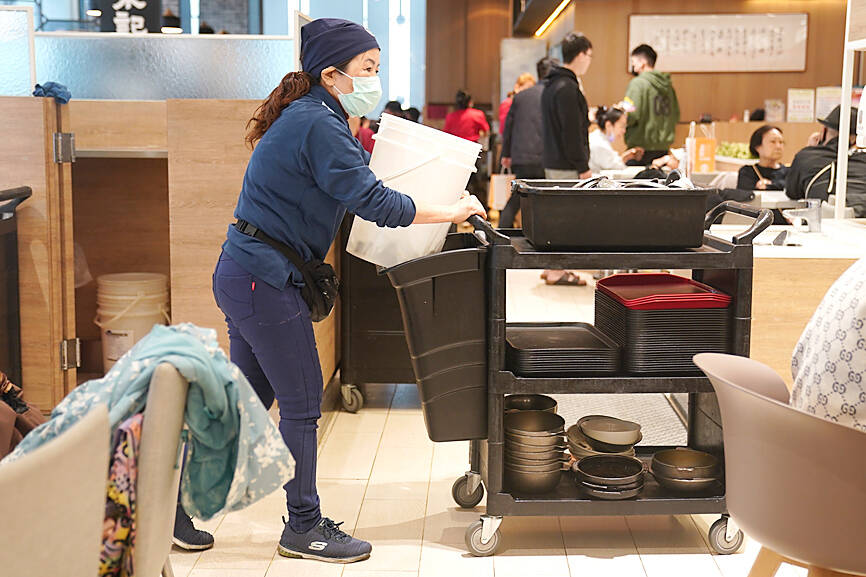Taiwan’s services sector is finding it hard to hire enough staff to contend with a post-COVID-19 pandemic pickup in tourism and spending, further pressuring the economy as Taiwan is struggling to return to growth.
Restaurateur Mai Bach finds the labor shortage problem impossible to avoid.
“Almost every restaurant” is dealing with a lack of workers, she said, adding that long-standing restrictions on foreign labor in the sector have made it tough to find a fix.

Photo: CNA
“Everyone’s just working double shifts,” said Bach, who cofounded the vegan restaurant group Ooh Cha Cha Ltd (自然食).
She said the problem has affected her friends in the industry, including one woman who was forced to reduce her restaurant’s operating hours because of a lack of staff.
Concerns about meeting demand are likely to exacerbate in the coming months as the nation tries to dig itself out of a deep economic slump.
The surging demand for workers is rooted in several factors. Like in many developed economies, the nation’s population is rapidly aging, with the elderly expected to account for more than 20 percent of the populace by 2025. Historically low wages in hospitality have complicated things, discouraging potential workers.
The pandemic created more problems as workers retired or left their jobs.
The labor force dropped sharply after reaching a record high in August 2019. While the number of people in the labor market has steadily risen in recent months, it still has not returned to pre-pandemic levels.
The staffing crunch described by Bach and others also comes as the unemployment rate hit a record low of 3.58 percent in February — suggesting the problem is more related to the lack of workers.
The shortfall has stretched across the hospitality industry.
Some hotels are afraid to take bookings due to a labor shortage, local media reported, citing comments made last month at a trade meeting by Regent Hotels & Resorts (晶華麗晶酒店集團) chairman Steven Pan (潘思亮).
“The shortage is everywhere and it’s creating huge pressure right now,” said Elliott Fan (樊家忠), a professor at National Taiwan University’s Department of Economics.
Labor market shocks from short-term factors — such as the pandemic — can take up to two years to resolve, he said.
That is troubling news for an economy already under strain from a big drop-off in global demand for computer chips, which is usually a key contributor to Taiwan's economic growth.
Tourism only accounted for 4 percent of the nation's GDP prior to the pandemic, but the economy now needs all the help it can get, Oxford Economics Ltd economist Lloyd Chan (陳進來) said.
“Taiwan is looking at a semiconductor downturn, so the tourism and services sector could now have an impact on GDP,” Chan said.

Taiwan Semiconductor Manufacturing Co (TSMC, 台積電) last week recorded an increase in the number of shareholders to the highest in almost eight months, despite its share price falling 3.38 percent from the previous week, Taiwan Stock Exchange data released on Saturday showed. As of Friday, TSMC had 1.88 million shareholders, the most since the week of April 25 and an increase of 31,870 from the previous week, the data showed. The number of shareholders jumped despite a drop of NT$50 (US$1.59), or 3.38 percent, in TSMC’s share price from a week earlier to NT$1,430, as investors took profits from their earlier gains

In a high-security Shenzhen laboratory, Chinese scientists have built what Washington has spent years trying to prevent: a prototype of a machine capable of producing the cutting-edge semiconductor chips that power artificial intelligence (AI), smartphones and weapons central to Western military dominance, Reuters has learned. Completed early this year and undergoing testing, the prototype fills nearly an entire factory floor. It was built by a team of former engineers from Dutch semiconductor giant ASML who reverse-engineered the company’s extreme ultraviolet lithography (EUV) machines, according to two people with knowledge of the project. EUV machines sit at the heart of a technological Cold

Taiwan’s long-term economic competitiveness will hinge not only on national champions like Taiwan Semiconductor Manufacturing Co. (TSMC, 台積電) but also on the widespread adoption of artificial intelligence (AI) and other emerging technologies, a US-based scholar has said. At a lecture in Taipei on Tuesday, Jeffrey Ding, assistant professor of political science at the George Washington University and author of "Technology and the Rise of Great Powers," argued that historical experience shows that general-purpose technologies (GPTs) — such as electricity, computers and now AI — shape long-term economic advantages through their diffusion across the broader economy. "What really matters is not who pioneers

TAIWAN VALUE CHAIN: Foxtron is to fully own Luxgen following the transaction and it plans to launch a new electric model, the Foxtron Bria, in Taiwan next year Yulon Motor Co (裕隆汽車) yesterday said that its board of directors approved the disposal of its electric vehicle (EV) unit, Luxgen Motor Co (納智捷汽車), to Foxtron Vehicle Technologies Co (鴻華先進) for NT$787.6 million (US$24.98 million). Foxtron, a half-half joint venture between Yulon affiliate Hua-Chuang Automobile Information Technical Center Co (華創車電) and Hon Hai Precision Industry Co (鴻海精密), expects to wrap up the deal in the first quarter of next year. Foxtron would fully own Luxgen following the transaction, including five car distributing companies, outlets and all employees. The deal is subject to the approval of the Fair Trade Commission, Foxtron said. “Foxtron will be